- Home
- Abi Elphinstone
Rumblestar
Rumblestar Read online
For Bertie, my godson.
May your life be filled with all sorts of wonderful adventures (and may you remember to ask Godmother Abi to come on a few of them from time to time).
The trouble with grown-ups is that they always think they’re right – about bedtimes and vegetables mostly, but also about beginnings. And, in particular, about the beginnings of our world. They have all sorts of ideas about big bangs and black holes, but if they had come across the Unmapped Kingdoms (which they wouldn’t have because secret kingdoms are notoriously hard to find), they would have learnt that at the very, very beginning there was just an egg. A rather large one. And out of this egg, a phoenix was born.
On finding itself alone, it wept seven tears, which, as they fell, became our continents and formed the earth as you and I know it, although to the phoenix all this was simply known as the Faraway. But these lands were dark and empty, so, many years later, the phoenix scattered four of its golden feathers, and out of these grew secret – unmapped – kingdoms, invisible to the people who would go on to live in the Faraway, but holding the magic needed to conjure sunlight, rain and snow, and every untold wonder behind the weather, from the music of a sunrise to the stories of a snowstorm.
Now the phoenix, being the wisest of all magical creatures, knew that if used selfishly, magic grows strange and dark, but if it is used for the greater good it can nourish an entire world and keep it turning. So the phoenix decreed that those who lived in the Unmapped Kingdoms could enjoy all the wonders that its magic brought, but only if they, in turn, worked to send some of this magic out into the Faraway so that the continents there might be filled with light and life. If the Unmappers ever stopped sharing their magic, the phoenix warned, both the Faraway and the Unmapped Kingdoms would crumble to nothing.
The phoenix placed the Lofty Husks in charge of each Unmapped Kingdom – wizards born under the same eclipse and marked out from the other Unmappers on account of their wisdom, unusually long life expectancy and terrible jokes – and, although in each kingdom the Lofty Husks took a different form, they ruled fairly, ensuring that every day the magic of the phoenix was passed on to the Faraway.
The four kingdoms all played different roles. Unmappers in Rumblestar collected marvels – droplets of sunlight, rain and snow in their purest form – which dragons transported to the other kingdoms so the inhabitants there could mix them with magical ink to create weather scrolls for the Faraway: sun symphonies in Crackledawn, rain paintings in Jungledrop and snow stories in Silvercrag. Little by little, the Faraway lands came alive: plants, flowers and trees sprang up, and so strong was the magic that eventually animals appeared and, finally, people.
Years passed and the phoenix looked on from Everdark, a place so far away and out of reach that not even the Unmappers knew where it lay. But a phoenix cannot live for ever. And so, after five hundred years, the first phoenix died and, as is the way with such birds, a new phoenix rose from its ashes to renew the magic in the Unmapped Kingdoms and ensure it was shared with those in the Faraway.
Time went by and the Unmappers grew to understand that every five hundred years another era would begin and, as long as the new phoenix showed itself to them on the night of its rising, the magic would be renewed and all would be well. Everyone believed things would continue this way for ever . . .
When you’re dealing with magic though, for ever is rarely straightforward. There is always someone, somewhere, who becomes greedy. And when a heart is set on stealing magic for personal gain, suddenly ancient decrees and warnings slip quite out of mind. Such was the case with a harpy called Morg who grew jealous of the phoenix and its power.
Seeking to claim the magic of the Unmapped Kingdoms for herself, Morg breathed a curse over the nest of the last phoenix on the very night of the renewal of magic two thousand years ago. The old phoenix burst into flames, like the rest of its kind had done before it, but this time the flames burned black and no new phoenix appeared from the ashes. And so, Morg claimed the nest as her own.
But when things go wrong and magic goes awry, it makes room for stories with unexpected heroes and unlikely heroines. Which is exactly what happened next . . . That same night, Smudge, a young girl from the kingdom of Crackledawn, was somewhere she ought not to have been, and she saw Morg tear across the sky in the place of the phoenix. With the fate of the Unmapped Kingdoms and the Faraway in her hands, Smudge, together with a monkey called Bartholomew, journeyed to Everdark, a place no Unmapper had been before. And it was there that Smudge tracked down Morg and locked the harpy’s wings, the very things that held her power, inside an enchanted tree deep in the forest.
The Unmapped Kingdoms and the Faraway were saved, but without the magic of the phoenix, the Lofty Husks in each kingdom had to set about searching for a way to preserve what was left of the old magic until the harpy died, or was killed, and a new phoenix rose from Everdark. The answer, as it happened, lay with the dragons that roamed the skies and the seas. Never before had these beasts heeded the call of the Lofty Husks – for they were wilder than the rest of the magical creatures – but they could sense the threat to the Unmapped Kingdoms and the Faraway, so they promised to scatter their sacred moondust every night, and though it didn’t grant as much magic as before, it was enough to keep things turning.
And that could well have been that until Morg died and a new phoenix rose. Except it wasn’t. Because when a harpy is set on evil, she doesn’t just slope away and give up. She plots and she plots and she plots until before you know it, she has hatched a new plan to steal the magic of the Unmapped Kingdoms . . .
But I am getting ahead of myself, and a certain eleven-year-old boy from the Faraway wouldn’t approve at all. At least, Casper Tock wouldn’t have approved before the Extremely Unpredictable Event happened, because up until then he very much lived his life according to his to-do lists and timetables. Admittedly, the lists often only included one item – grow up quickly – but his timetables were much more detailed, from the five minutes he allowed himself before breakfast each morning to straighten the pictures on his bedroom walls to the half hour he spent before going to sleep every night refolding all of his clothes.
Casper liked to keep a tidy bedroom, an organised mind and a tight schedule. That way, fewer things went wrong and there was less chance – or so he thought – of wandering into the clutches of school bullies Candida Cashmere-Jumps and Leopold Splattercash.
But no matter how many lists you write and no matter how many timetables you create, you cannot be responsible for your parents. They forget keys, lose handbags, misplace spectacles and drop phones down the loo. In fact, once you reach the grand old age of eleven, you can start to realise that your parents are hopelessly out of control.
Such was the case with Casper’s parents, Ernie and Ariella Tock. They had been out of hand for quite some time and they were, in fact, largely to blame for everything that happened to Casper that dreary afternoon in March. Because if Ernie had come home on time that day and if Ariella had remembered her handbag, then perhaps the Extremely Unpredictable Event might never have happened at all.
But sometimes it is when people are late and handbags are forgotten that magic begins to unfold . . .
Casper crouched inside the Lost Property basket in the corridor outside his classroom. The school timetable stated, very firmly, that he should be in Mr Barge’s geography lesson, but his own timetable, which was, at this second, folded neatly into his palm, stated that he should be exactly where he was – surrounded by dirty blazers and smelly sports kit.
Casper shifted his weight. Thirty minutes was a long time to be wedged inside a wicker basket, but it had become an important part of his Thursday afternoons. Because only by telling Mr Barge that he had a piano lesson or a dentis
t appointment or an errand to run for the headmaster, and hiding in Lost Property instead, could Casper overhear the lesson and the homework instructions (thereby not falling behind in his studies or causing Mr Barge to question his absences) whilst avoiding crossing paths with Candida and Leopold.
By and large, Little Wallops Boarding School was a friendly place – and with its wood-panelled dining room, enormous fireplaces and stone gargoyles it was rather beautiful, too – but in every school there are rotten eggs, the sort of children who write complaint letters to Father Christmas and ask their parents for a pocket-money raise. Candida and Leopold were two such children, and while Casper had previously managed to avoid both of them because they were in different classes, this term Candida and Leopold’s geography teacher had been off sick so Casper’s personal timetable had needed some considerable adjustments.
Casper risked a peep over the top of the basket. Mr Barge always left his classroom door open (apparently it made hurling pupils out of lessons far more straightforward), and though from where he crouched Casper couldn’t see Candida or Leopold, or any of his classmates for that matter, he had a clear view of his teacher, who was, at this moment, flinging exercise books towards his pupils.
‘Down the centre, Ben – quick, catch! On the wing, Ruby – look sharp!’
Mr Barge, a middle-aged man the size and shape of a drawbridge, doubled up as a geography teacher and a rugby coach and he often got the two confused.
Another exercise book shot, like a rugby ball, across the room, and Mr Barge’s voice boomed through the door and out into the corridor.
‘Coming through, Oliver! You’ll have to jump for this one!’
A short, sharp thump followed. Casper winced. He guessed Oliver had tried to jump for his book – and missed.
Mr Barge performed several lunges which made his suit squeak at the seams, then he threw his class a toothy grin. ‘Hustle in, Year Six. Hustle in.’
There were a few nervous scrapes as the pupils pulled their chairs closer.
‘We’ve all seen the newspaper headlines these past few weeks: what the nation thought was a one-off hurricane in England at the beginning of March has now escalated into a worldwide weather crisis. The hurricanes across Europe are becoming more frequent – the United Kingdom has been ravaged by gale-force winds four times in the last week alone – and –’ he paused ‘– more deadly.’
Casper shivered. He’d seen the news that morning. The hurricane on Monday had been confirmed as the worst yet. Thousands of people had lost their homes where it struck in London and hundreds of casualties had been reported. And all that had happened despite the warning sirens recently wired up inside buildings across the country – because the hurricanes came fast, faster often than the time it took the Met Office to trigger the sirens when the winds looked like they were picking up.
The hurricanes had been coming every few days for the last month, and they had flattened Little Wallops’ cricket pavilion, ripped slates off the school roof, shattered windows and left several sixth formers with broken limbs when the door to the sports hall had been wrenched off its hinges and launched across the gym. Corridors were lined with buckets catching leaks and windows had been barred with planks of wood. But Little Wallops was still standing – just – and so far, there had been no fatalities. Everyone knew that could change though; they were living each day on a knife edge. An underground bunker was being dug to provide more shelter, but that would take time and even when it was ready, would the sirens give everyone enough warning to reach it?
‘And that’s not to mention what’s happening further afield,’ Mr Barge went on. ‘Multiple tornados are rampaging across America, whirlwinds are tearing up Africa and typhoons are smashing through Asia and Australia. Meteorologists agree that climate change could be a key factor behind the recent weather disruption – we know global warming has hit critical levels in the past year – but that still wouldn’t explain the haphazard pattern of these storms. Hurricanes normally come in from the oceans and hit coastal regions but these ones are striking up left, right and centre, defying any recognisable weather behaviour, which is why it’s so hard to predict their nature. But our meteorologists are determined to get to the bottom of it all. And, as geographers, I feel that we should do the same, particularly since the school holidays this Easter have been postponed due to continued road and rail closures and we’ll all be staying here until the lockdown is over and it’s safe enough for your parents to collect you.’
Casper could hear a few of the pupils nearest the door sniffing back tears. They knew that leaving Little Wallops before the all-clear for resumed travel would be foolish, and that arguing with a man the size and shape of a drawbridge would be pointless, but that didn’t stop them missing their families. Casper felt suddenly relieved that he and his parents had been offered free accommodation in the school, as well as a bursary place for Casper, because his parents both taught at Little Wallops – at least it meant they were all together now.
Mr Barge pretended not to notice all the sniffing; he found crying children deeply unsettling. ‘Your extra homework task is to pick one of the disasters reported this week and produce a case file on it. Think what, where, when, who and – the biggest question – why? Climate change will come into it, of course, but are there other reasons for the strange behaviour of these storms?’ Mr Barge rolled up his sleeves. ‘I’ll expect your reports on Monday and I want you to tackle this homework in the same way the mighty Shane Hogarth of the Wallop Wanderers tackled six of his opponents at once in the Rugby Sevens Finals last year.’ He paused. ‘Really look your homework in the eye and give it what for.’
There was a confused sort of silence.
Casper craned his neck a little further out of the basket and saw his classmate Sophie raise a timid hand. Sophie was the closest thing Casper had to a friend – they sat together at lunch and sometimes paired up for science projects – but Casper made sure conversations focused strictly on schoolwork. Because friendships, and all the complicated emotions and unpredictable feelings that came with them, had proved to be nothing other than disastrous for Casper in the past.
When he first started at Little Wallops, back in Year One, he had tried to make friends, but even then Candida and Leopold had singled him out as being different. They had teased and taunted Casper and every time he had tried to make a friend they’d somehow ruined things – until, finally, Casper decided that he’d had enough. Making friends was painful and messy and frightening, and despite his parents’ best efforts to encourage him to try again, Casper decided it was just not worth the trouble. Life was a good deal simpler, and safer, without the trauma of tackling friendships. And so, little by little, Casper’s world had shrunk until the very idea of taking risks, trying new things or even momentarily veering off timetable made him feel quite queasy.
Casper watched now as Sophie plucked up courage to ask her question. ‘S . . . sir, I’m holding a cake sale in the gym on Sunday to raise money for those who have lost their homes because of the hurricanes and I still have to make a few more flyers. Please can I have an extension on the homework?’
Mr Barge flexed his biceps. ‘Did the mighty Shane Hogarth ask for an extension when the Roaring Rovers were closing in at half-time?’
Sophie frowned. ‘Um, probably not, sir?’
‘Then you have my answer.’ At that, Mr Barge muttered something about a class scrum to finish the day off, but thankfully for his pupils, the bell rang instead. Casper’s heart quickened. He had a matter of seconds to scramble out of the Lost Property basket, blend into the stream of pupils pouring out of their classrooms and rushing along the corridor, then leg it across the library to the door that led up to the turret he and his parents lived in.
A tide of children advanced towards him and, clutching his timetable to his chest, Casper clambered out of the basket and joined the throng. He was small for his age, and slight, which helped with ducking, weaving and scuttling by unnoticed. Down the
corridor he sped, beneath the newly fitted sirens and past the buckets catching leaks – then, when everyone else peeled off towards their after-school clubs, Casper turned into the library.
If he had been a different sort of child he might have paused to dilly-dally between the shelves and leaf through the books, but Casper wasn’t one for detours. Especially when the librarian, Mrs Whereabouts, was taking a coffee break in the staffroom, which meant there wouldn’t be adult supervision in the library should Candida and Leopold appear. Casper nipped between the first few bookshelves, sidestepping the fallen plasterwork from a recent storm, then burst out into the aisle that ran the length of the library.
After a few strides he noticed the smell: the unmistakable tang of hairspray. Casper’s chest thumped. Candida Cashmere-Jumps was in the library. There was a piggish snort from somewhere nearby and Casper’s toes curled inside his shoes. Leopold Splattercash was in here, too.
But that’s impossible, Casper thought. I followed my timetable exactly; Candida and Leopold couldn’t possibly have made it to the library before me – I left the Lost Property basket the moment the bell rang! He gulped. Unless they skived Mr Barge’s geography lesson, too, and got a head start on me . . .
Casper flung himself into a run but as he did so, a girl and a boy slid out from a bookcase several metres in front.
Casper stopped in his tracks.
Candida was tall, thin and terribly vain. She only ever smiled when looking at herself in the mirror and she only ever laughed when other people cried. Leopold, on the other hand, was small, round and terribly stupid. If asked to recite the two times table he broke out in a light sweat and he still couldn’t spell his own name. He and Candida had one thing in common though: money.
Candida’s father had set up a luxury cashmere clothing range which was sold in every department store in the world, while Leopold’s ancestors had done something very suspicious and very profitable with an ostrich egg and a diamond in the eighteenth century. But when money is the glue that holds a friendship together, the results are often deeply unpleasant.

 Everdark
Everdark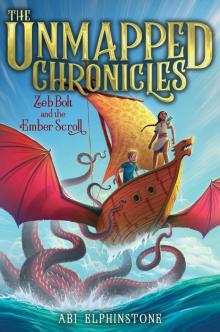 Zeb Bolt and the Ember Scroll
Zeb Bolt and the Ember Scroll Rumblestar
Rumblestar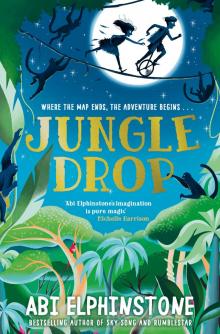 Jungledrop
Jungledrop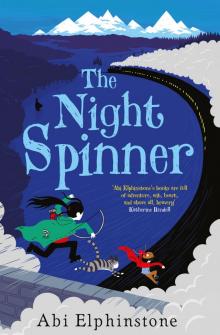 The Night Spinner
The Night Spinner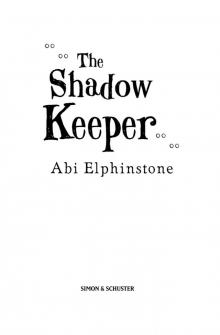 Soul Splinter
Soul Splinter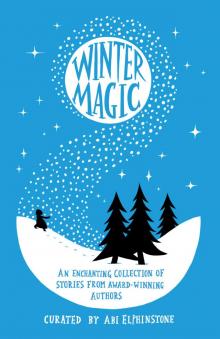 Winter Magic
Winter Magic The Dreamsnatcher
The Dreamsnatcher Sky Song
Sky Song